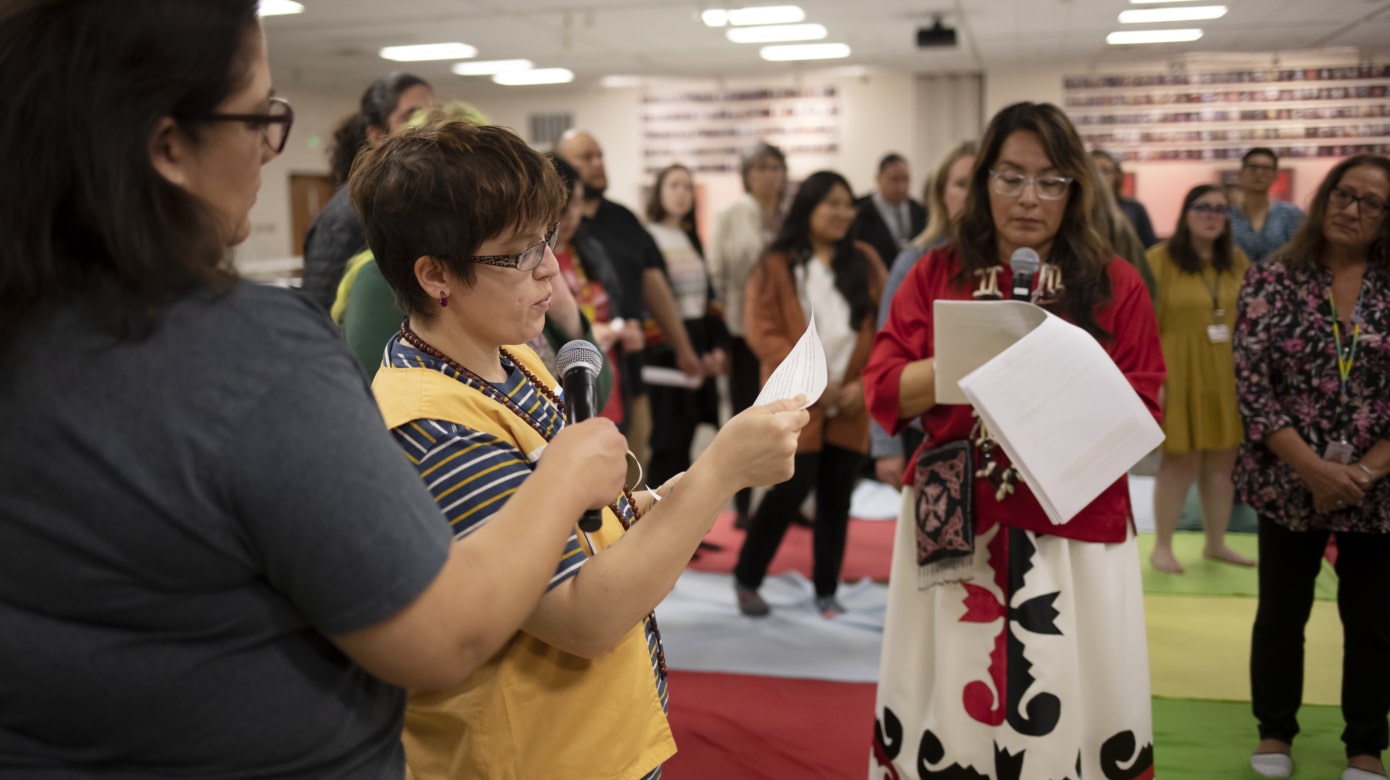A presentation that portrayed the harmful effects of colonization and forced relocation resonated with area educators. The Citizen Potawatomi Nation’s Cultural Heritage Center hosted a blanket healing exercise for education professionals.
The National Indian Education Association offers the Indigenous Empowerment and Resilience Training to area communities. NIEA seeks to implement the blanket healing exercise in local communities, both Native and non-Native, according to the NIEA website. The purpose of the training is to foster truth, understanding, respect and reconciliation among Indigenous and non-Indigenous people. The program was developed in collaboration with Indigenous elders, knowledge keepers and educators.
The exercise was created in 1997 by KAIROS, a Canadian organization that advocates for international ecological justice and human rights.
In the training, participants stand on brightly colored blankets representing a region of North America. Exercise leaders read a historical timeline of Indigenous peoples, and participants see the true scope of colonial contact, treaty-making, colonization and resistance, according to the NIEA. At the conclusion, participants discuss the experience and process their feelings.
“People often say, ‘You never know what someone is going through until you walk a mile in their shoes,’” said CPN Education Director Tesia Zientek. “In a lot of ways, this exercise takes that expression to heart by offering a participatory experience.”
“I believe educators will have a new depth of empathy for their Indigenous students if they understand the history and trauma that our ancestors have experienced,” she said. “With that understanding, I hope that educators can foster a more inclusive and culturally responsive learning environment.”
Education professionals from Shawnee, McLoud, Norman and other schools attended the event.
Angie Thurman Goodfox, Indian Education advisor at Shawnee High School, and her daughter, Tara Goodfox, Indian Education advisor at Shawnee Middle School, said the presentation was moving.
In their roles, they both help Native American students with their educational needs, offer support and help facilitate understanding between Indigenous students and non-Indigenous teachers.
“You hear about (Indigenous history), you read about it, and you’ve known about it, but to actually have the hands-on (experience),” Thurman Goodfox said. “It just made it even more real.”
Thurman Goodfox (Sac and Fox, Comanche) is hopeful that non-Native educators will attend a session. She believes the training will help educators understand the perspective of Native students.
“One third of the students at Shawnee High School are enrolled tribal members,” she said. “And that’s just one school. We can talk (to educators) until we’re blue in the face, but this hands-on exercise will help them understand. So, I definitely encourage other educators to try it.”
Tara Goodfox (Sac and Fox, Otoe, Comanche) said the experience reminded her of the generational trauma many Indigenous people have experienced and continue to experience.
“It was so informative, and I liked how interactive it was,” Goodfox said. “Everyone had to get up and actually participate. It was very, very helpful.”
“It was a very eye-opening exercise. It’s intense, for non-Native people as well.”
After nearly 17 years in education, Thurman Goodfox said she often sees the challenges students struggle to overcome, from living in an unstable environment to turning to substance abuse to escape emotional pain.
Thurman Goodfox said the 2021-2022 school year was a challenging one, with students still processing their feelings and emotions about the coronavirus pandemic, quarantine and other stressors. She said the opportunity to talk and support fellow educators was needed.
Tara Goodfox said having just a couple of education professionals who are aware of what their Native students may be experiencing can help so many students.
“Our kids have a lot going on,” she said. “There are kids who aren’t having their needs met. We just need more people to be aware, whether it’s teachers, counselors or the principal. Just one little, ‘Are you okay?’ may make the difference to kids.”
Zientek, who currently serves as the treasurer of the NIEA board, said the workshop is widely available to educators who are interested.
“This is an outstanding opportunity for schools to offer a uniquely powerful professional development,” she said. “Because NIEA is a national organization, the workshop can be offered anywhere throughout the United States.”
The NIEA was formed by Native educators in 1969 to encourage national discourse on Native education. For more information on the blanket exercise, contact Melanie Johnson at mjohnson@niea.org or visit niea.org.

